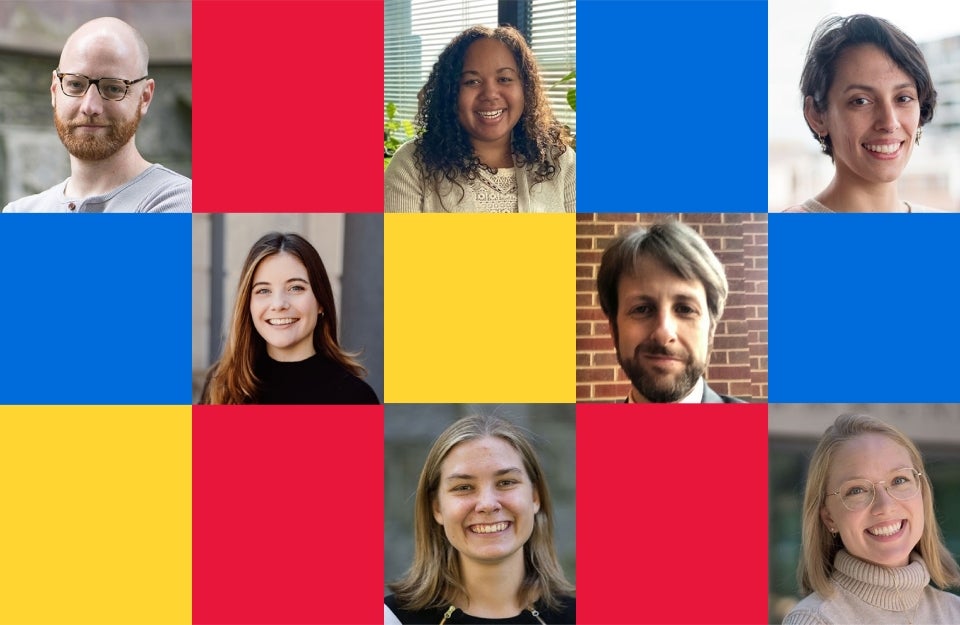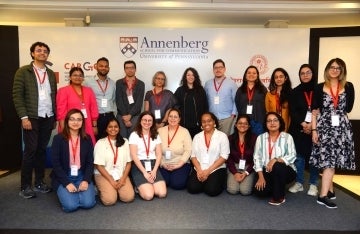The Annenberg School Welcomes Eight New Ph.D. Students
The 2021 cohort of doctoral students have research interests that run the gamut from political psychology to feminist activism on social media, and much more.

As in-person classes resume at Penn after more than a year of online learning, The Annenberg School for Communication is proud to welcome its newest cohort of doctoral students. The eight students in our 2021 cohort bring a well-rounded span of backgrounds and experiences to the program, with stints in data engineering, legal practice, and clinical research listed among the accomplishments on their impressive CVs.
While none of the students were local to Philadelphia, Lucila Rozas has travelled the furthest of the cohort. Originally from Cusco, Peru, Rozas received her Licenciatura (five-year undergraduate degree) in Political Science from Pontificia Universidad Católica del Perú and her M.Sc. in Sociology from the University of Amsterdam. Her most recent academic work focuses on social media’s role in identity construction, discourse, activism, and social change. At Annenberg, she hopes to continue in this line of research by qualitatively exploring the socio-technical practices and discourses of Latinx feminist activists on social media.
Like Rozas, many in the first-year doctoral cohort came to Annenberg having earned other advanced degrees. In fact, Neil Fasching also completed his master’s education at the University of Amsterdam, where he earned an M.S. in Political Communication. Fasching is interested in the causes and consequences of partisanship and studies topics related to political psychology, with a specific focus on affective polarization, partisan identity, and partisan violence.
Prior to joining Annenberg, Julia Cope received her M.S. in Information Science from the University of Pittsburgh and worked as a data engineer and business analyst. She studies how people learn and make decisions based on information about science and technology that they encounter online, and how that engagement affects their worldviews and actions.
Matthew Conaty also comes to the program with advanced degrees, as well as prior professional experience outside of academia. He holds an M.A. in history from Yale University and a J.D. from Harvard Law School, and practiced media, First Amendment, and telecommunications law in a variety of public and private roles before coming to Annenberg. Conaty’s research interests center on the roots of the modern media ecosystem.
Further reflecting the cohort’s wide range of backgrounds, E. Grybos previously worked as an engineer at Intel. Her team was tasked with nascent 5G technologies and applications, including a 2-in-1 tablet that debuted at the 2018 Winter Olympics. Grybos’s research focuses on the evolving relationship between developing technology, access, and communication to inform long-term implications for global democracy and power balances.
Brittany Zulkiewicz holds an M.P.H. from Johns Hopkins University and a B.S. in neuroscience from Duke University. Prior to Annenberg, she worked as a research analyst at RTI International’s Center for Communication Science. She researches the effects of mass media and social marketing campaigns on health, health behavior, and health disparities.
Another student who is engaged in the realm of health communications, Thandi Lyew, investigates the effects of message framing on environmental decisions and health behavior. Her research explores how messaging can target cognitive barriers that influence decisions regarding health and sustainability. Prior to joining Annenberg, she worked as a clinical research coordinator in several research labs within the Department of Psychiatry at the University of Pittsburgh.
Among the new doctoral students, interdisciplinary interests are another common thread. Liz Hallgren uses anthropological research methods to examine the role of media in destabilizing notions of democracy and citizenship. She is interested in the linkages between journalism, literature, genre, and the construction of political subjectivity— and what these linkages mean for news-making, the public sphere, and its relationship to democracy.
Welcome, new students! We begin the academic year masked and, at times, socially distanced, but we are thrilled to have you join us on campus, and look forward to seeing much more of your accomplishments— and your faces— in the years to come.



